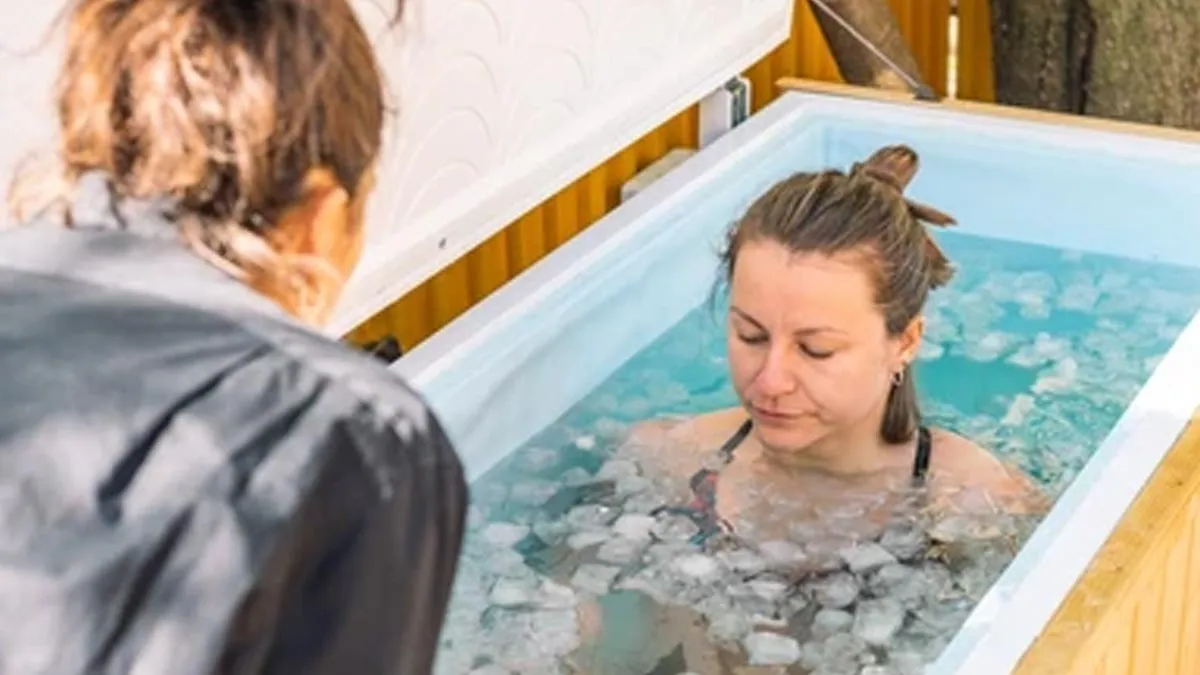
The idea of voluntarily submerging yourself in icy water might sound like a medieval torture technique rather than a path to wellness. However, a growing body of research, coupled with anecdotal evidence, suggests that regular ice baths can offer a surprising array of mental and physical health benefits. And the best part? You can easily incorporate this invigorating practice into your routine from the comfort of your own home.
Table of Content:-
We spoke with Dr. Shrey Kumar Srivastav, General Physician and Senior Consultant at Sharda Hospital in Noida, who shed light on the science-backed advantages of taking the plunge. "While the initial shock might be daunting, the body's response to cold water immersion can trigger a cascade of positive physiological and psychological effects," explains Dr. Srivastav. "When practiced safely and consistently, weekly ice baths can be a powerful tool for enhancing overall well-being." Here are six compelling reasons to try an ice bath at least once a week:
1. Boost Your Resilience to Stress
The immediate reaction to cold water is a stress response. Your heart rate increases, and your body releases stress hormones like cortisol and norepinephrine. However, with regular exposure, your body becomes more efficient at managing this stress. "Think of it as a form of hormesis – a little bit of stress that makes you stronger," says Dr. Srivastav. "Over time, your nervous system adapts, leading to a blunted stress response in everyday situations. You'll find yourself feeling calmer and more in control, even when facing challenges."
Also Read: UP Govt To Set Up 200-Bed Super Speciality Hospitals For Heart, Kidney And Cancer In Every District

2. Reduce Inflammation and Soothe Sore Muscles
Athletes have long used ice baths to aid recovery after intense workouts. The cold temperature constricts blood vessels, which helps to reduce swelling and inflammation in muscles. While you don't need to be a professional athlete to benefit, Dr. Srivastav notes that "for individuals experiencing muscle soreness from exercise or even general aches and pains, a weekly ice bath can offer significant relief. It can help flush out metabolic waste products and promote faster healing."
3. Sharpen Your Mental Focus and Improve Mood
That initial gasp of cold air does more than just shock your system; it triggers the release of norepinephrine, a hormone and neurotransmitter that plays a crucial role in attention, focus, and mood regulation. "The surge of norepinephrine can lead to increased alertness and mental clarity," explains Dr. Srivastav. "Many individuals report feeling a significant mood boost after an ice bath, likely due to the release of these feel-good chemicals." This can be particularly beneficial for combating feelings of sluggishness or low energy.
4. Enhance Your Immune System
Emerging research suggests a potential link between cold water immersion and immune system function. While more studies are needed, some findings indicate that regular exposure to cold may increase the production of white blood cells, which are essential for fighting off infections. Dr. Srivastav advises, "While ice baths shouldn't replace conventional medical treatments, the potential for boosting the immune system through regular cold exposure is promising and warrants further investigation."

5. Improve Circulation
The body's response to the cold involves the constriction of blood vessels near the skin's surface. When you get out of the ice bath, these blood vessels dilate, leading to improved blood flow throughout the body. "This improved circulation can have various benefits, from delivering more oxygen and nutrients to tissues to aiding in waste removal," says Dr. Srivastav. "Over time, this can contribute to better overall cardiovascular health."
6. Cultivate Mental Toughness and Discipline
Let's face it, willingly stepping into an ice bath requires a certain degree of mental fortitude. Overcoming the initial discomfort and staying in the cold water, even for a short period, can build mental resilience and discipline. "The act of consciously choosing to face discomfort and pushing through it can translate to other areas of your life," Dr. Srivastav points out. "It can foster a sense of control and the ability to tackle challenges with greater determination."
Tips To Get Started Safely at Home
Before diving in, Dr. Srivastav emphasizes the importance of safety:
- Start Slow: Begin with shorter durations (e.g., 30 seconds to 1 minute) and gradually increase the time as you become more comfortable. Aim for a water temperature between 10-15°C (50-59°F).
- Listen to Your Body: If you feel extreme discomfort or pain, get out. Shivering is a natural response, but excessive shivering should be avoided.
- Never Go Alone: Especially when starting, have someone nearby in case you need assistance.
- Consult Your Doctor: Individuals with pre-existing heart conditions, Raynaud's phenomenon, or other health concerns should consult their physician before trying ice baths.
- Use a Thermometer: Ensure the water temperature is within a safe range.
- Prepare Properly: Have warm clothes and a towel ready for after your ice bath.
Incorporating a weekly ice bath into your wellness routine might seem daunting at first, but the potential mental and physical health benefits are compelling. As Dr. Srivastav concludes, "When approached safely and consistently, this practice can be a powerful tool for enhancing resilience, reducing inflammation, boosting mood, and fostering a stronger connection between your mind and body. So, take a deep breath, embrace the chill, and discover the invigorating power of the ice bath."
Also watch this video
How we keep this article up to date:
We work with experts and keep a close eye on the latest in health and wellness. Whenever there is a new research or helpful information, we update our articles with accurate and useful advice.
Current Version